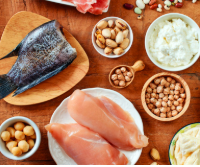In the world of balanced nutrition, few components play as central a role in lasting fullness as protein. Often celebrated for its muscle-building properties, protein’s ability to support satiety—our feeling of fullness after eating—makes it a cornerstone in many wellness strategies. Understanding how protein contributes to a sense of satisfaction can help guide daily meal choices, encouraging healthier eating patterns and supporting long-term well-being.
At its core, satiety is the sensation that curbs the urge to keep eating. It helps the body recognize that it has received enough nourishment. Among the three main macronutrients—protein, carbohydrates, and fat—protein is consistently shown to be the most satiating. This means that when meals are built around a healthy source of protein, people are more likely to feel full for longer, reducing the urge to snack mindlessly between meals or overeat at the next one.
The science behind this satiety effect lies in how protein interacts with hormones and digestion. When we eat protein, it slows the emptying of the stomach, which extends the time it takes for food to move through the digestive system. As a result, the body experiences a steadier, more sustained release of energy. Additionally, protein stimulates the release of certain hormones that signal fullness to the brain, such as peptide YY and GLP-1. These hormones help reduce hunger levels naturally, supporting a more mindful approach to eating.
Another unique quality of protein is its effect on blood sugar. Unlike simple carbohydrates, which can cause quick spikes and drops in blood sugar levels, protein helps stabilize them. This stability plays a crucial role in preventing the sudden hunger pangs or energy crashes that often follow a high-sugar or low-fiber meal. By keeping energy levels more consistent, protein helps people stay focused, active, and content between meals.
Including a protein-rich component in every meal doesn’t have to be complicated. From classic options like eggs, chicken, turkey, and fish to plant-based sources such as beans, lentils, tofu, and quinoa, there are many ways to introduce variety and balance. Even snacks can be adjusted to include more protein—for example, choosing Greek yogurt, cottage cheese, or a handful of nuts instead of processed treats.
The power of protein also shines when it comes to maintaining a healthy weight. Because protein helps curb excessive hunger, people who prioritize it in their meals often find it easier to manage portion sizes. Over time, this can support sustainable lifestyle goals. Rather than relying on strict calorie counting or eliminating entire food groups, focusing on the inclusion of quality protein can naturally guide better food decisions.
In addition to its physical benefits, protein’s contribution to satiety supports emotional and mental health. Feeling overly hungry or constantly unsatisfied can lead to irritability, reduced concentration, and a sense of frustration with one’s eating habits. Meals that leave us full and content are more likely to create a positive relationship with food—one that is free from guilt and built on nourishment rather than restriction.
It’s also worth noting that protein needs vary depending on factors like age, activity level, and health goals. For example, individuals engaged in regular physical activity or strength training may require more protein to support muscle repair and recovery. Older adults may also benefit from higher protein intake to maintain muscle mass and bone health. Regardless of one’s background, the underlying principle remains: when meals consistently include adequate protein, the result is often improved satisfaction and fewer cravings.
A common misconception is that protein-rich meals must be heavy, expensive, or time-consuming. In reality, simple and affordable options exist for every lifestyle. A bowl of lentil soup, a stir-fry with tofu and vegetables, or a smoothie blended with protein-rich dairy or seeds can all deliver the benefits without much effort. Cooking with protein doesn’t have to feel restrictive or repetitive—it can be an invitation to explore new flavors, textures, and cultural dishes.
Meal timing also plays a role in how protein supports fullness. Including a protein source at breakfast, for instance, can help set a positive tone for the day by reducing the likelihood of mid-morning hunger. Spreading protein intake evenly across meals, rather than consuming it mostly at dinner, is another helpful strategy. This balanced approach supports better digestion, muscle maintenance, and overall wellness.
One of the most encouraging aspects of protein’s role in satiety is that it empowers people to eat with more awareness. Instead of following rigid food rules, individuals can begin tuning into how different meals make them feel. Meals that include protein often lead to a sense of nourishment and balance, which supports better eating decisions throughout the day.
It’s also important to choose lean and wholesome protein sources when possible. While occasional indulgences are a normal part of life, relying on heavily processed meats or fried options may not offer the same health benefits. Prioritizing grilled, baked, or plant-based proteins provides the fullness people seek while also supporting heart and digestive health.
In the context of long-term habits, consistency with protein intake is key. Incorporating it in a way that suits one’s preferences, culture, and schedule makes it more likely to become a sustainable part of everyday life. Whether someone is focused on energy, mood, weight balance, or overall nutrition, protein serves as a reliable foundation that complements other healthy choices.
In conclusion, meals that are rich in protein offer more than just fuel—they provide lasting satisfaction, help manage hunger, and support a healthier, more balanced lifestyle. By understanding how protein influences satiety, individuals can make informed decisions that lead to greater well-being, one meal at a time. Choosing protein mindfully and consistently is a friendly step toward feeling fuller, longer—and feeling better overall.














